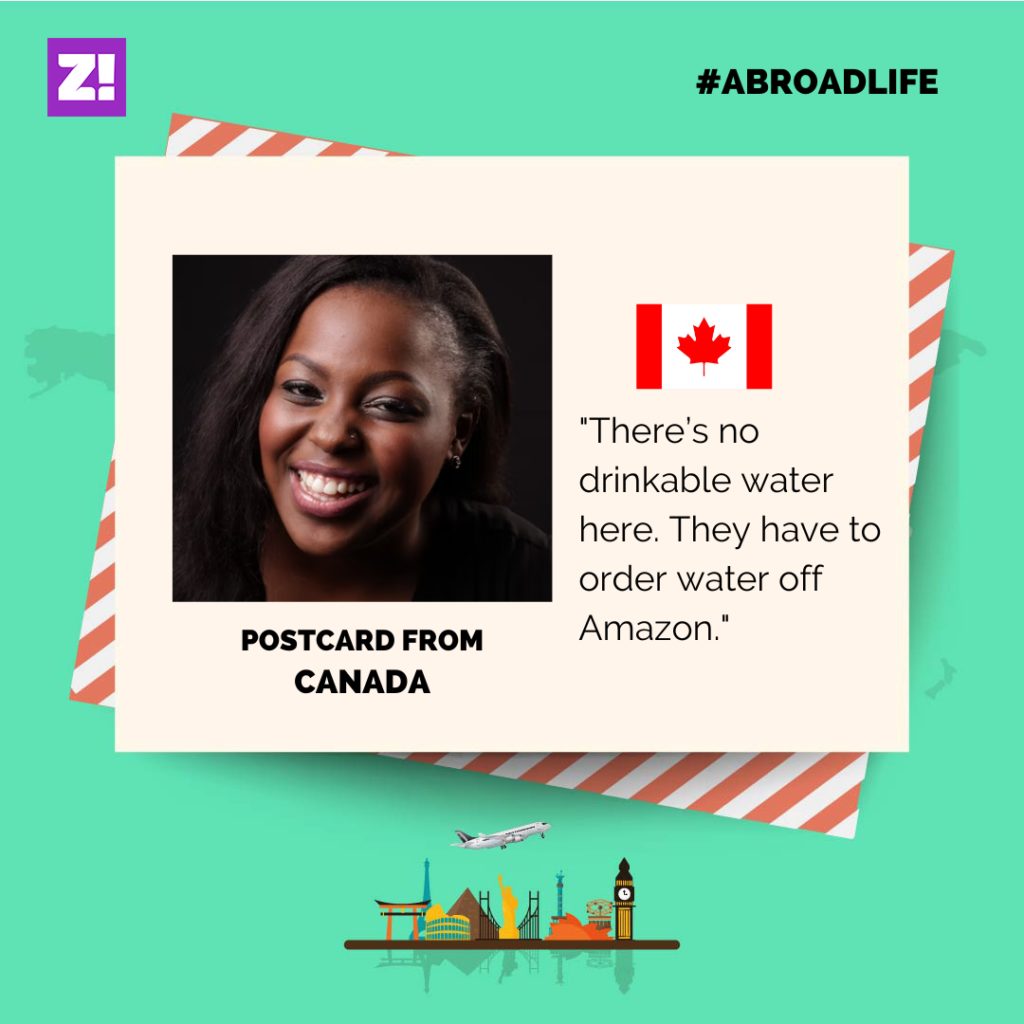The Nigerian experience is physical, emotional, and sometimes international. No one knows it better than our features on #TheAbroadLife, a series where we detail and explore Nigerian experiences while living abroad.
If you worked with villages whose inhabitants had to order drinking water off Amazon but still avoided the internet like a plague, you probably wouldn’t think Canada is great. That’s the life of this week’s subject on #AbroadLife, and she can’t wait to leave.

When did you move to Canada?
January 2019. I came here for my master’s.
Why Canada?
First of all, I’d looked forward to moving out of Nigeria since I finished university in 2017. The plan was to move abroad for a master’s but not anywhere in Asia or the US.
Ah. Why?
At the time, I was dating a guy who lived in China, and he’d been learning Mandarin for five years. I’m terrible at learning languages so I couldn’t see myself going to a place where I had to learn a different language to survive. Then I’d read online, in books and articles, and found out from people who live in Asian countries, that Asians are very racist. White people still have some sort of political correctness with their racism, but Asians will clearly show they don’t like you. I stayed all my life in Jos and encountered many Chinese and Indian people; even in Nigeria, they aren’t nice to Nigerians.
At some point, I got a tuition-free scholarship in Germany, but I rejected it for the same language reason. I didn’t want to learn German.
What about America?
Omo, Trump was moving mad at that time. Immigration rules kept changing. It’s bad enough someone is an immigrant, but being an immigrant in a country that’s difficult for immigrants is a no-no.
What was the process for relocating to Canada like?
It went well until Nigeria tried to ruin it by restricting people from paying for anything more than $100 online. I had to reach out to an aunt in the US to help me pay.
Was that your first time abroad?
No. In 2010, I went to Scotland to visit my mum who was doing her PhD there. In fact, my sisters and I tried to move there to stay with her, but we were denied because the entire family wasn’t moving. My dad had decided to stay in Nigeria because he liked his job here, and the embassy thought we couldn’t be divided as a family.
A year later, a friend whose mum was also doing a PhD in the UK tried to move there with their siblings and without their dad. They got their visa. That’s when I knew visa decisions are between you, the immigration officer and God.
LMAO. Expectation vs reality: Canada edition
My expectation was everything would be smooth sailing; I’d come here, do my master’s, get a recognised degree, everyone would be dying to employ me and I’d build a great community of friends with like minds.

LMAO. This doesn’t sound like it ended well
Reality: I struggled to find a community, realised winter is a bitch no matter how many jackets you wear, fell in snow and ice multiple times, got my degree even though it cost me my entire mental health, and eventually realised job-hunting is hard.
I don’t even know where to start
LMAO. The thing with jobs is that different cities have different needs. So you can study development economics — like I did — and when you graduate, find out your city actually needs teachers and healthcare workers. Many foreigners find themselves in situations like this and struggle.
I —
Another expectation people have is they can visit all their friends who live in Canada when they get here. The truth is Canada is big, their friend probably doesn’t live in the same province as them and travelling costs an arm, a leg and a kidney. And they probably also won’t have the time to travel because they’re working all the time.
What about the community?
Black people are a minority in Canada. If you live in big cities like Toronto and Vancouver, you’ll see many black people. But if, like me, you stay in a more remote city, it’s like finding gold. It’s difficult to build community because white people here are unexposed. They hardly see black people, and they’re not well travelled or willing to learn about other cultures. So it’s just stereotypes and racism left, right and centre.
I used to go swimming a lot before, and my God, if you see the way children would gather at the pool and stare. It was obvious they hadn’t seen a black person before. And their parents’ reactions were always to drag them away and say, “Don’t stare. Don’t stare.”
There’s this thing people say about Canadians being the nicest people ever. On the surface level, it’s true. But when you live here for some time, you realise it’s all a load of bullshit. They’re just smiling and nodding; they’re not listening to the things you say. They’re just being nice for niceness’ sake.
Canada’s PR in the mud
Nigerians coming to Canada might also think there’s blazing internet everywhere here. LOL. In my region, there’s an entire 10-hour-drive highway with absolutely no network. They advice people to travel that highway with a satellite phone. Also, I work with villages, and they have just dirt roads.
You work in a village?
Yes. I work as a development economist for the local government, and my focus is on helping village businesses get customers so the communities can get better.
How’s that going?
Village life is one-kind o. There’s no drinkable water here. They have to order water off Amazon. The people here don’t have the community and vibrancy you’ll see in Nigerian villages. They just look dejected, wallow in their suffering and complain about the government. They don’t even eat well. It’s just stuff like Oreos and soda all the time. When some of them eventually move, they forget home.
You know I said my job is to help businesses make more money?
Yep
It’s hard. For context, the villages I work with are like a three-hour drive from anywhere else. So tell me why these people avoid the internet like a plague. Apart from using it to get the essentials like water, they don’t want to have anything to do with the internet. It’s like they think it’s evil. How would they see customers from outside if people don’t even know they’re there?
All of this sounds terrible. Why don’t you leave?
I get paid really well. That’s why I’ve been here for this long. But I’m currently applying for other jobs and taking on certification courses. I think I’ll be ready to leave by the end of 2022. Maybe this time, to a private-sector job.
Are you coming back to Nigeria?
I wanted to, right after my master’s in 2020, but the news of danger and the terrible economy kept me here. My end goal is to move to a predominantly black country sha.
Why?
I need to be surrounded by black goodness.
What’s that?
It’s a vibe black people give that white people can’t.
Also Read: “I Financed My Japa by Freelancing Online”- Abroad Life
Hey there! My name is Sheriff and I’m the writer of Abroad Life. If you’re a Nigerian and you live or have lived abroad, I would love to talk to you about what that experience feels like and feature you on Abroad Life. All you need to do is fill out this short form, and I’ll be in contact.




